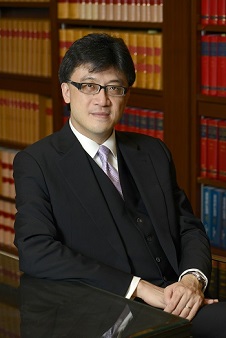Paul SHIEH Wing-tai, Senior Counsel
Sir Edward Youde Memorial Overseas Fellowship 1988/89
Senior Counsel,
Temple Chambers
 I was awarded the Sir Edward Youde Overseas Postgraduate Fellowship in 1988 to study the BCL degree at Oxford. I wanted to study the law governing international commercial transactions and disputes, which was regarded as essential to Hong Kong’s long term prosperity as an economic city. Oxford was famous for its teaching of the subject of Jurisprudence (the full name of which is “Jurisprudence and Political Theory”). However, I had little interest in the subject at the time. To me, law was a set of rules, to be ascertained only through reading cases and analysing the words of statutes. Jurisprudence, or the Philosophy or Theory of Law, is best left to philosophers and academics to debate in the abstract. After all, you do not win a case by citing a text on Jurisprudence.
I was awarded the Sir Edward Youde Overseas Postgraduate Fellowship in 1988 to study the BCL degree at Oxford. I wanted to study the law governing international commercial transactions and disputes, which was regarded as essential to Hong Kong’s long term prosperity as an economic city. Oxford was famous for its teaching of the subject of Jurisprudence (the full name of which is “Jurisprudence and Political Theory”). However, I had little interest in the subject at the time. To me, law was a set of rules, to be ascertained only through reading cases and analysing the words of statutes. Jurisprudence, or the Philosophy or Theory of Law, is best left to philosophers and academics to debate in the abstract. After all, you do not win a case by citing a text on Jurisprudence.Fast forward 34 years. I may not be wiser, but have definitely grown older. One thing which I lament about my time at Oxford is that I did not seize the opportunity to study Jurisprudence properly. It is after you had seen the law in its broader societal and political context that you begin to realize the relevance of Jurisprudence. Is it enough, for there to be a “legitimate” legal system or “Rule of Law”, that there are merely laws which are interpreted and applied by independent judges? Is it relevant to examine the substantive content of the laws, or the manner in which such laws are made and enforced? Should we explore the nature of any duty to obey the law? Is “Rule of Law” based on a certain political ideology?
There may not be a single “right” answer on these. The point is that these are well established topics of discussion which should be seriously addressed by lawyers in any civilized society. It would be remiss of leaders in any legal system (the judiciary, the profession, the executive and the academia), to gloss over them. A study of law (or Jurisprudence) in a liberal and rigorous setting, aided by the SEYMF, will stand our future leaders in very good stead to bear these matters in mind, both in the discharge of their duties, and in addressing the public.
I wish the SEYMF all the best in its future endeavours.